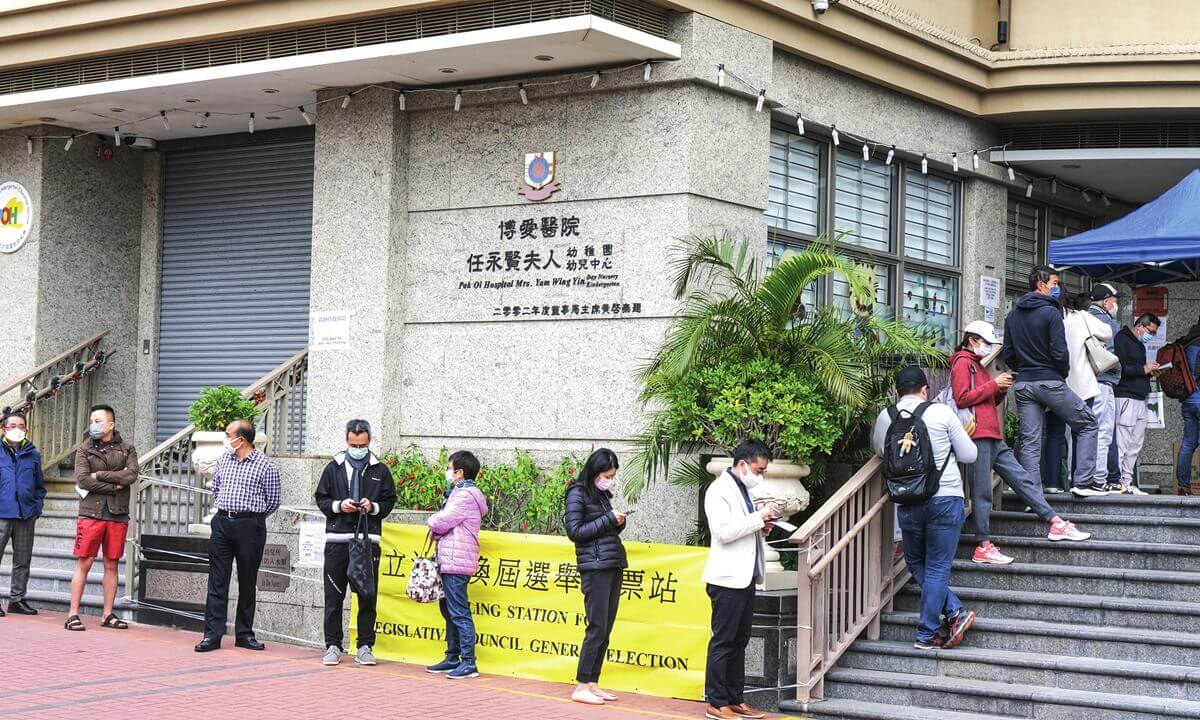The Hong Kong Special Administrative Region (HKSAR) held its controversial seventh Legislative Council (LegCo) election on Sunday. It was the first election held under the new Beijing-imposed rules of allowing only patriots to participate in the race and witnessed a record low turnout of voters. A total of 153 candidates competed for 90 seats, and an analysis by local news outlet HK01 found that 82 of the seats were won by pro-Beijing members. Only one candidate was from a non-establishment camp, while the political background of the other candidates is unknown.
Although the city’s government had enthusiastically encouraged its 4.5 million registered voters to participate in the election by making public transport on the voting day free as well as sending out mass texts, voter participation was only 30.2%, the lowest figure since the United Kingdom handed control of Hong Kong over to China in 1997. Furthermore, a few activists were arrested after they were caught urging voters to boycott the election or to leave their ballots blank. While casting a blank vote is legal, the new changes make it illegal to incite people not to vote.
The 2021 #LegislativeCouncilGeneralElection registers about 30% turnout rate for its geographical and functional constituencies and the turnout rate for the Election Committee constituency is close to 99% #BarnabasFung https://t.co/UVR5j9H70p
— Hong Kong SAR Government News (@newsgovhk) December 20, 2021
The new electoral system that was imposed by China in May allows the government to remove public officials from office and bar candidates from standing in elections if they are deemed “disloyal” to local authorities or Beijing. Called the Loyalty Law, the new system is among a series of measures taken by China to intensify its crackdown on the sovereign freedoms of Hong Kong, which is legally designated as an autonomous region under the “One Country, Two Systems” policy enshrined under the Basic Law.
The election was condemned by the West for “the erosion of democratic elements.” The G7, the Five Eyes alliance, and the European Union (EU), all voiced their “grave concern” over the outcome of the elections on Monday. “We call on China and the Hong Kong authorities to restore confidence in Hong Kong’s political institutions and end the unwarranted oppression of those who promote democratic values and the defence of rights and freedoms,” the statement from the EU noted.
While the West criticised the election for being undemocratic, China has welcomed the favourable election results. Chinese state-owned media house Global Times hailed the election for being “highly representative” for including candidates who are “experienced political figures, talented young people, scholars, accountants, lawyers, construction workers, bus drivers, and “Hong Kong drifters.””
Similarly, the Liaison Office of the Central People’s Government in the HKSAR released a statement lauding the election as “a successful practice of democracy with Hong Kong characteristics.” The statement further added that the election has demonstrated “the strengths and advantages of the improved electoral system” and is “a further implementation of the principle of “patriots administering Hong Kong.”
Hong Kong’s pro-Beijing leader Carrie Lam also said that she looks forward to working with a new “widely representative” council. Ahead of her annual trip to Beijing that began yesterday, Lam further added that she anticipates “reasonable, practical interactions” with the newly elected pro-establishment leaders of the financial hub.

